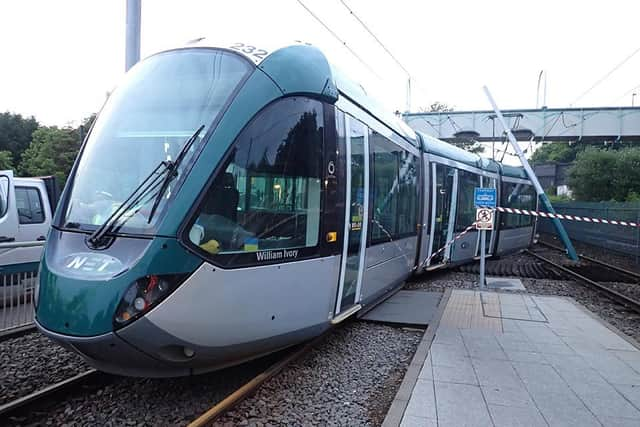Tram operator says 'lessons will be learned' following report into Bulwell derailment
and live on Freeview channel 276
The report, from the Rail Accident Investigation Branch (RAIB), has made three recommendations which Nottingham Express Transit (NET) says it will act upon.
The incident happened at around 5.06pm on June 12 last year when a southbound tram, travelling at around 25mph approached a set of facing points in an unsafe condition at the north end of Bulwell tram stop.
Advertisement
Advertisement
As it travelled over the points, the first and second bogies of the tram were routed in different directions and the tram subsequently derailed.


During the derailment, the tram struck a pole that supported overhead line equipment causing a pane of glass to dislodge and strike a passenger, resulting in minor injuries.
The driver of the tram also suffered a minor injury, while significant damage was caused to the tram and infrastructure, with the line not reopening until June 23, following extensive repairs.
Accident investigators found the set of spring-loaded points were in an unsafe position because they had not reset correctly after the passage of the previous two northbound trams.
Advertisement
Advertisement
This can sometimes happen in normal working conditions, but the risk of this happening at the time of the accident had possibly been increased due to the environmental conditions causing the slide plates to be dry or contaminated.
A visual indicator located alongside the points, which was showing that the points were not in the correct position, was not observed by the tram’s driver, who believed they would be informed if there were any issues with a set of points but had not been so on this occasion.
The driver had probably become conditioned to there being no issues at this location and was also possibly distracted.
RAIB’s investigation found that NTL did not have an effective policy in place to inform drivers of points failures and had not specifically assessed the risk of a driver incorrectly passing a lineside indicator.
Advertisement
Advertisement
RAIB also observed that the process NTL used when introducing a new system to the tram fleet had not considered the effect the change may have on its tram drivers.
RAIB has made three recommendations, all addressed to NTL.
The first is a review of control room policy and procedures to ensure that clear and practical guidance is available to manage the response to engineering faults.
The second relates to the improvement of risk assessments in light of this accident.
The third recommendation concerns the consideration of human factors when assessing the effects of a proposed engineering change.
Advertisement
Advertisement
RAIB has also identified a learning point to remind tram drivers to not make assumptions about the status of signals or indicators based on their previous experience.
A NET spokesperson said: “Throughout the RAIB’s investigation, we have worked closely with investigators to establish what lessons can be learned.
“The recommendations made in the RAIB’s report have already been implemented, including updating our control room procedures and driver training. Our risk assessments are also under constant review, taking into account wider light rail best practice.
“Customers can be assured that safety is always NET’s highest priority, and we are committed to doing everything we can to prevent similar incidents in the future.”
